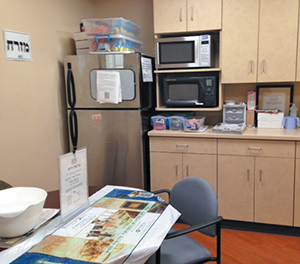
Teaneck–No one wants to be in the hospital. No one wants their loved one to be in the hospital. Everyone knows that, including those at Holy Name Medical Center. If you have no choice and you must be there, Holy Name strives to make its patients and their visitors as comfortable as possible.
One way Holy Name does that is to stick to its mission and provide culturally sensitive services for everyone in the community. They recognize that the patient is a whole person and should not be defined strictly by his or her medical problem. They treat the patient within the context of who they are.
The Pastoral Care Department at Holy Name plays a key role in reaching that whole person. It’s managed by a Catholic nun, Sister Breda Boyle, but the department includes many other clergy and lay people as well. They all work to see to it peoples’ religious needs are satisfied. However, the work is not relegated to one department. It’s a top down belief that extends from Holy Name CEO and President Michael Maron and is demonstrated by every staff member.
All the staffers at Holy Name are trained to understand the needs of people of different cultures and religions, including observant Jews, and workshops are held to discuss their special needs. For example, employees learn why call bells won’t be used on Shabbos and Yom Tov, how Shabbos elevators, electronic doors, operate and why they are needed; nutritionists and nurses learn about kosher food and challenges regarding signatures on Shabbos, and other related issues. Due to knowledge and sensitivity derived from these sessions, Holy Name personnel recognize situations such as when someone has been sitting awhile on Shabbos and they offer to get something for that person–snack, drink–because they know the person can’t handle money.
Debbie Ross has lived in Teaneck and worked at Holy Name since 1973. In 1992, Ms. Ross returned to Holy Name and has served as a Nurse for Information Technology. That technology is used to educated hospital personnel on the finer points of Jewish observance. She said, “There is a fundamental understanding that we treat a diverse population and being sensitive to the cultural and religious beliefs of (to) the population is important for their well-being, treatment and outcome.” Ms. Ross is one of the go to people when it comes to working with the observant Jewish community.
Rabbi Michael Ross, her husband, began organizing Bikur Cholim visits to Holy Name 35 years ago, by arranging Shabbos visits by members of Beth Aaron. These days Arlene Eis organizes Bikur Cholim visits from Sunday to Thursday. She said, “We’re a volunteer organization of about 60 very dedicated, very generous, men and women from all over Bergen County. Our group is not shul or town based, it is simply made up of people who want to perform the mitzvah of Bikur Cholim.” Nina Glick is one such volunteer. When visiting on Thursdays, she delivers boxes with an electric candle, grape juice, wine cup, plastic flower, and a challah. Ms. Glick said, “The hospital is 100% accommodating.” The boxes are supplied weekly by Chesed 24/7 and Bikur Cholim Partners in Health.
Holy Name Hospital also provides a Shabbos room in the hospital, where two guests can sleep. There is also a kosher lounge stocked with supplies on a regular basis by high school students from the Sinai Schools program, in conjunction with Chesed 24/7. A local minyan schedule is posted in the Shabbos room. If for some reason Holy Name can’t accommodate the visitors, neighbors close by are willing to help those in need.
When it comes to the Yomim Tovim, for more than 20 years, Shalom Fisch has volunteered to make holiday rounds. On Rosh Hashanah, he comes blows shofar for the patients. On Purim, he reads the Megillah from Holy Name’s chapel, and patients are able to view and listen to the reading via closed circuit television. The candlelighting on each night of Channukah, also takes place in the chapel and can be viewed via closed circuit television. For the past three years, Holy Name has had a Sukkah that was donated, and is built by the maintenance department staff every year.
Fisch says, “These things need to be done and someone has to do it.” Mr. Fisch, whose father, R. Stanley Fisch, was the volunteer chaplain at Holy Name for 20 years, is continuing his father’s legacy. His children join him in these mitzvoth, and so the legacy continues from generation to generation.
By Larry Bernstein











